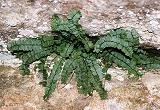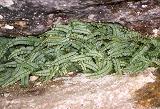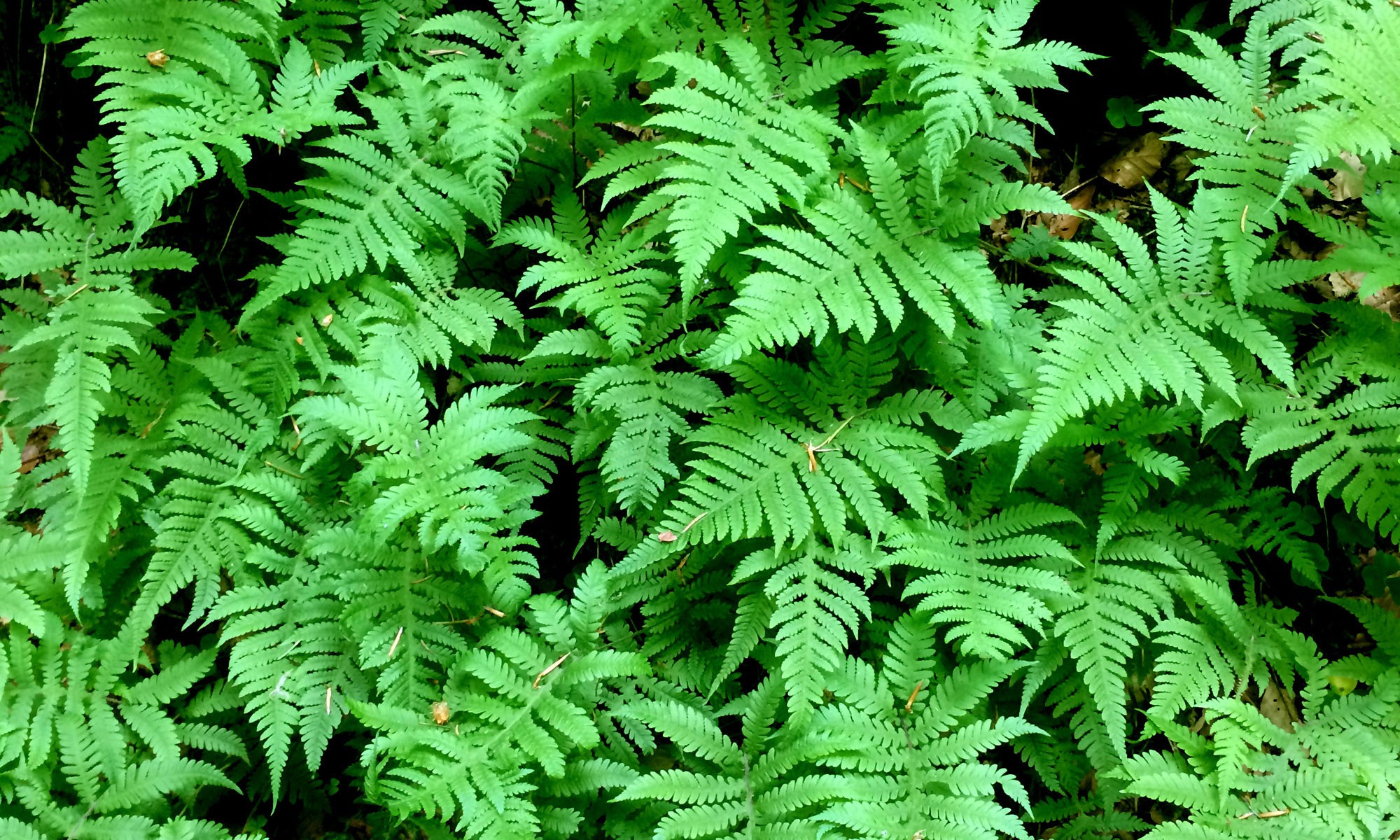 Asplenium trichomanes L. subsp. pachyrachis (Christ) Lovis & Reichstein
Asplenium trichomanes L. subsp. pachyrachis (Christ) Lovis & Reichstein
 Lobed Maidenhair Spleenwort
Lobed Maidenhair Spleenwort
 Capillaire à pétiole épais
Capillaire à pétiole épais
 Dickstieliger Brauner Streifenfarn
Dickstieliger Brauner Streifenfarn
 Gelappte Brongstillege Sträifefar
Gelappte Brongstillege Sträifefar
Class: Polypodiopsida
Family: Aspleniaceae
Status
LRlc – lower risk least concern

Description
Investigation in order to localise Asplenium trichomanes L. subsp. pachyrachis (Christ) Lovis & Reichstein (Lobed Maidenhair Spleenwort) and to fix the distribution area for Luxembourg.
Asplenium trichomanes L. subsp. pachyrachis (Christ) Lovis & Reichstein
(Syn.: Asplenium csikii Kümmerle & Andras.) [Aspleniaceae, Pteridophyta]

The Maidenhair Spleenwort (Asplenium trichomanes L.) is present throughout Luxembourg and quite frequent in natural rock habitats, as well as on walls of all types. Generally two subspecies of Asplenium trichomanes are distinguished: the rare subsp. trichomanes, growing on silicious rocks, and the common, rather calcicole subsp. quadrivalens. A third subspecies, Asplenium trichomanes subsp. pachyrachis (Lobed Maidenhair Spleenwort) – found in Europe at scattered locations – is known for Luxembourg since the early 1990-ties. Until 2001 only a few sites where known in Luxembourg, almost exclusively in the ‘Petite Suisse’ area.

The plants of Asplenium trichomanes subsp. pachyrachis [Photo 1] are usually smaller and of paler coloration than those of subsp. quadrivalens. They always form a flat rosette of fronds which spread closely over the rock face, in a ‘starfish’ manner) [Photo 2].  The pinnae, usually subtriangular or even hastate are often overlapping, which gives each frond a congested overall appearance [Photo3]. Generally longer and more distinctly lobed than in the other subspecies, the pinnae are characterised by an often deeply crenately toothed margin with a conspicuous hyaline border.
The pinnae, usually subtriangular or even hastate are often overlapping, which gives each frond a congested overall appearance [Photo3]. Generally longer and more distinctly lobed than in the other subspecies, the pinnae are characterised by an often deeply crenately toothed margin with a conspicuous hyaline border.

Asplenium trichomanes subsp. pachyrachis can hybridise with subsp. quadrivalens, forming a vigorous plant with a more upright habit than subsp. pachyrachis and distinctly intermediate between the parents. It is known as Asplenium trichomanes L. nothossp. staufferi Lovis & Reichstein [Photo 4]. This hybrid is easily found in areas where the two parents are present and grows on natural rocks as well as on man-made walls.
A rapid investigation of natural sandstone outcrops, buildings, walls, … showed that Asplenium trichomanes subsp. pachyrachis is rather common in the sandstone area. Here it occurs on natural, often vertical rock surfaces, in crevices on steep rocks, as well as on sandstone walls. At present date [13/10/2020], many sites in over 80 square kilometers are known. Most of the sites occur in the ‘Petite Suisse’ area, but the Lobed Maidenhair Spleenwort is present in the whole sandstone area as far as Luxembourg-City.
The results of the investigations, with a description of the subspecies, the present distribution and status in Luxembourg can be found in:
Krippel, Y., 2003. – Aire de répartition et statut d’Asplenium trichomanes L. subsp. pachyrachis (Christ) Lovis & Reichstein(Aspleniaceae, Pteridophyta) au Luxembourg. – Bull. Soc. Nat. luxemb. 104: 3-12. [PDF 384 KB]
Suggested citation of this webpage
Krippel, Y., 2025. Asplenium trichomanes L. subsp. pachyrachis (Christ) Lovis & Reichstein. In: Online atlas of the pteridophytes of Luxembourg. URL: https://pteridophytes.lu/asplenium-trichomanes-subsp-pachyrachis/ [accessed 2025-05-31].
